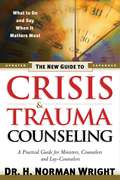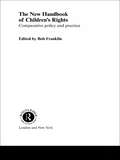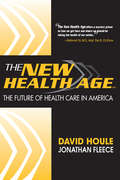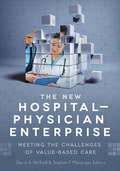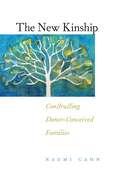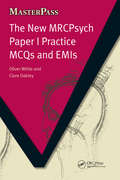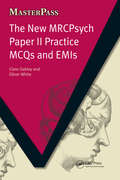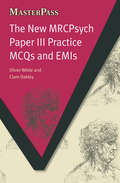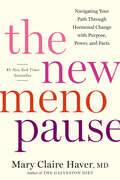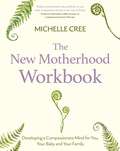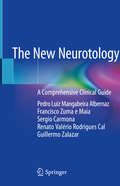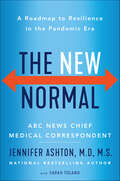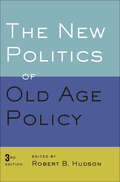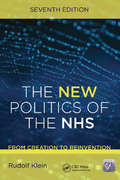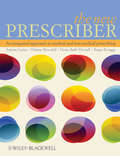- Table View
- List View
The New Glucose Revolution Shopper's Guide to GI Values 2009
by Brand-MillerWhether you’re grocery shopping, planning dinner, eating out, or meeting with your nutritionist or dietitian, the fourth annual edition of the Shopper’s Guide to GI Values 2009-previous editions of which have sold more than 140,000 copies-is a must for everyone seeking healthier eating habits. Newly revised and updated, the convenient, at-a-glance tables make this the one necessary guide for people following the glycemic index (GI) for health conditions such as diabetes, heart disease, or PCOS; to lose weight; or to improve their overall well-being and fitness. Shopper’s Guide is the only annually updated book of GI values, featuring more than 1,200 foods and their GI values and comprehensive nutritional data for calories, fat, saturated fat, cholesterol, fiber, and sodium.
The New Guide to Crisis and Trauma Counseling
by H. Norman WrightAn informative and practical guide for beginning or lay counselors and those in situations that require immediate action in emergency situations. This relaunch of Crisis Counseling is upgraded and expanded, with new material and anecdotes in chapters that cover the areas of crisis intervention, how to counsel the depressed, the suicidal, and those going through divorce, children and adolescents crisis, and more. This classic volume on the trauma of loss and grief provides excellent instruction on what to do for others in the first 72 hours following a crisis for those who are helpless to help themselves.
The New Handbook of Children's Rights: Comparative Policy and Practice
by Bob FranklinThe new edition of this well established handbook provides up-to-date information on a topic of increasing importance across a range of disciplines and practices. It covers:* the debate concerning children's rights and developments in rights provision over the last twenty years* the impact of recent British legislation on children's rights in key a
The New Health Age
by David Houle Jonathan FleeceFrom leading futurist David Houle (recently named "Speaker of the Year" by Vistage International) and leading healthcare attorney Jonathan Fleece, comes this surprising, innovative look at the future of healthcare--and how we can lead the successful reorganization of healthcare in America.
The New Hospital-Physician Enterprise: Meeting The Challenges Of Value-based Care (ACHE Management)
by David WoffordShifting reimbursement models are forcing hospital executives to rethink their approach to physician relationships. New cost and quality demands require hospitals to explore all alternatives—including tighter alignment with physicians. This book provides expert advice on structuring and sustaining hospital-physician relationships in the post-reform environment. This comprehensive guide discusses: Strategies for successful acquisition and integration of physician practices, including advice on managing the transaction, governance and management structures, sustainable physician compensation models, and optimized revenue cycle operations Alternative alignment strategies for physician practices that remain a separate legal entity, such as joint ventures, clinical comanagement arrangements, accountable care organizations, and the use of information technology Special considerations for physician practice acquisitions, including fair market value compliance and the implications of payment reform
The New Kinship: Constructing Donor-Conceived Families (Families, Law, and Society #14)
by Naomi R. CahnNo federal law in the United States requires that egg or sperm donors or recipients exchange any information with the offspring that result from the donation. Donors typically enter into contracts with fertility clinics or sperm banks which promise them anonymity. The parents may know thedonor’s hair color, height, IQ, college, and profession; they may even have heard the donor’s voice. But they don’t know the donor’s name, medical history, or other information that might play a key role in a child’s development. And, until recently, donor-conceived offspring typically didn’t know that one of their biological parents was a donor. But the secrecy surrounding the use of donor eggs and sperm is changing. And as it does, increasing numbers of parents and donor-conceived offspring are searching for others who share the same biological heritage. When donors, recipients, and “donor kids” find each other, they create new forms of families that exist outside of the law. The New Kinship details how families are made and how bonds are created between families in the brave new world of reproductive technology. Naomi Cahn, a nationally-recognized expert on reproductive technology and the law, shows how these new kinship bonds dramatically exemplify the ongoing cultural change in how we think about family. The issues Cahn explores in this book will resonate with anyone—and everyone—who has struggled with questions of how to define themselves in connection with their own biological, legal, or social families.
The New Laws of Psychology: Why Nature and Nurture Alone Can't Explain Human Behaviour
by Peter KindermanThis controversial new book describes how human behaviour - thoughts, emotions, actions and mental health - can be largely explained if we understand how people make sense of their world and how that framework of understanding has been learned. In this ground-breaking book, Peter Kinderman, presents a simple, but radical new model of mental well-being. Published following the publication of the new edition of the controversial, Diagnostic and Statistical Manual, the author challenges notions such as 'mental illness' and 'abnormal psychology' as old-fashioned, demeaning and invalid, and argues that diagnoses such as 'depression' and 'schizophrenia' are unhelpful. Kinderman argues that one consequence of our current obsession with a medical approach to human well-being and distress, is that human problems are too often merely diagnosed and treated, rather than understood. Written by an expert in his field, and accessible to all those interested in and affected by mental health issues, The New Laws of Psychology will change the way we define mental illness forever.
The New MRCPsych Paper I Practice MCQs and EMIs (MasterPass)
by Clare Oakley Oliver White Mogobe RamoseThe new MRCPsych examination has changed significantly. Instead of two distinct parts, there are now three written papers and one clinical exam. This book is completely up-to-date and takes into account the new format. It provides 250 practice best-of-five multiple choice questions (MCQs) and 100 extended matching items questions (EMIs) for Paper I. It contains clear, concise solutions to each question as an aid to revision. It is comprehensive and authoritative, with both authors being members of the Psychiatric Trainee's Committee of the Royal College of Psychiatrists. As well as being an essential revision aid for candidates sitting Paper I, it is also useful when preparing for Papers II and III because of the many similarly themed questions.
The New MRCPsych Paper II Practice MCQs and EMIs: MCQS and EMIs (MasterPass)
by Clare Oakley Oliver White Theo SchofieldThe structure of the MRCPsych examination has changed significantly. This book is specifically written for the new exam, providing 250 practice best-of-five multiple choice questions (MCQs) and 100 extended matching item (EMI) questions for Paper II. It contains clear, concise answers to questions, along with explanatory notes and further reading for each topic. It gives practical advice on the format and content of the examination and techniques for answering questions. It is comprehensive and authoritative: both authors are members of the Psychiatric Trainees' Committee of the Royal College of Psychiatrists. This is an essential revision aid for candidates sitting Paper II of the MRCPsych examination.
The New MRCPsych Paper III Practice MCQs and EMIs: Practice MCQs and EMIs (MasterPass)
by Clare Oakley Oliver White Alexandra C. RankinThe structure of the MRCPsych examination has changed significantly. This book is specifically written for the new exam, providing 250 practice best-of-five multiple choice questions (MCQs) and 100 extended matching item (EMI) questions for Paper III. It contains clear, concise answers to questions, along with explanatory notes and further reading for each topic. It gives practical advice on the format and content of the examination and techniques for answering questions. It is comprehensive and authoritative: both authors are members of the Psychiatric Trainees' Committee of the Royal College of Psychiatrists. This is an essential revision aid for candidates sitting Paper III of the MRCPsych examination.
The New Martians: A Scientific Novel
by Nick KanasThe year is 2035, and the crew from the first expedition to Mars is returning to Earth. The crewmembers are anxious to get home, and ennui pervades the ship. The mood is broken by a series of mysterious events that jeopardize their safety. Someone or something is threatening the crew. Is it an alien being? A psychotic crewmember? A malfunctioning computer? The truth raises questions about the crewmembers' fate and that of the human race. In this novel, the intent is to show real psychological issues that could affect a crew returning from a long-duration mission to Mars. The storyline presents a mystery that keeps the reader guessing, yet the issues at stake are based on the findings from the author's research and other space-related work over the past 40+ years. The novel touches on actual plans being discussed for such an expedition as well as notions involving the search for Martian life and panspermia. The underlying science, in particular the psychological, psychiatric, and interpersonal elements, are introduced and discussed by the author in an extensive appendix.
The New Menopausal Years: Wise Woman Ways
by Susun S. WeedSusun S. Weed spent 13 years talking with more than 50,000 women about menopause. Here are the remedies, the wisdom, and the humor she found. Whether your menopause is natural or induced, you, too, will treasure this book called "the menopausal bible" by millions of women. All the remedies women know and trust plus 100 new pages including: Fibromyalgia Hairy Problems Restless Leg Syndrome Fertility After Forty Thyroid Health Interstitial Cystitis Herbs for Women on ERT/HRT Memory Problems
The New Menopause: Navigating Your Path Through Hormonal Change with Purpose, Power, and Facts
by Mary Claire Haver MD#1 NEW YORK TIMES BESTSELLER • Take charge of your health with this invaluable guide to everything a woman needs to know about menopause during her hormonal transition and beyond—by the bestselling author of The Galveston Diet.A NEW YORK POST BEST BOOK OF THE YEARMenopause is inevitable, but suffering through it is not! This is the empowering approach to self-advocacy that pioneering women&’s health advocate Dr. Mary Claire Haver takes for women in the midst of hormonal change in The New Menopause. A sweeping, authoritative book of science-backed information and lived experience, it covers every woman&’s needs:• From changes in your appearance and sleep patterns to neurological, musculoskeletal, psychological, and sexual issues, a comprehensive A to Z toolkit of science-backed options for coping with symptoms.• What to do to mediate the risks associated with your body&’s natural drop in estrogen production, including for diabetes, dementia, Alzheimer&’s, osteoporosis, cardiovascular disease, and weight gain.• How to advocate and prepare for annual midlife wellness visits, including questions for your doctor and how to insist on whole life care.• The very latest research on the benefits and side effects of hormone replacement therapy.The bible of midlife wellness, The New Menopause arms women with the power to secure vibrant health and well-being for the rest of their lives.
The New Motherhood Workbook: Developing a compassionate mind for you, your baby and your family (Compassion Focused Therapy)
by Michelle CreeLearn how to develop compassion for yourself and your familyHaving a baby can be a time of joy, but also one of anxiety and challenge. Although the period of time through pregnancy and infancy is relatively short, mothers have a sense of its importance and often work hard both mentally and physically to get it 'right'. This fascinating and practical self-help book will guide mothers-to-be and new mothers through the maze of parenting advice and confusing feelings that can arise.It explains how a brain state called 'the compassionate mind' has developed through evolution to be a particularly powerful way of helping us to get through the challenges of life with confidence, strength and steadiness.Using this workbook you will learn:· Powerful techniques for creating a sense of support, safeness and joy for you, your baby and your family in which you can all best flourish. · How to understand and attune to the mind of your child to create a secure attachment. · How to create the basis for a compassionate mind in your child so that they can navigate the challenges of life and make positive and healthy relationships.Filled with interactive exercises and practical skills, The New Motherhood Workbook will be a source of support through the perinatal period.THE COMPASSIONATE MIND APPROACH The self-help books in this series are based on Compassion Focused Therapy (CFT, developed by series editor Paul Gilbert). This brings together an understanding of how our mind can cause us difficulties but also provides us with a powerful solution in the shape of mindfulness and compassion. It teaches ways to stimulate the part of the brain connected with kindness, warmth, compassion and safeness, and to calm the part that makes us feel, anxious, angry, sad or depressed.
The New Motherhood Workbook: Developing a compassionate mind for you, your baby and your family (Compassion Focused Therapy)
by Michelle CreeLearn how to develop compassion for yourself and your familyHaving a baby can be a time of joy, but also one of anxiety and challenge. Although the period of time through pregnancy and infancy is relatively short, mothers have a sense of its importance and often work hard both mentally and physically to get it 'right'. This fascinating and practical self-help book will guide mothers-to-be and new mothers through the maze of parenting advice and confusing feelings that can arise.It explains how a brain state called 'the compassionate mind' has developed through evolution to be a particularly powerful way of helping us to get through the challenges of life with confidence, strength and steadiness.Using this workbook you will learn:· Powerful techniques for creating a sense of support, safeness and joy for you, your baby and your family in which you can all best flourish. · How to understand and attune to the mind of your child to create a secure attachment. · How to create the basis for a compassionate mind in your child so that they can navigate the challenges of life and make positive and healthy relationships.Filled with interactive exercises and practical skills, The New Motherhood Workbook will be a source of support through the perinatal period.THE COMPASSIONATE MIND APPROACH The self-help books in this series are based on Compassion Focused Therapy (CFT, developed by series editor Paul Gilbert). This brings together an understanding of how our mind can cause us difficulties but also provides us with a powerful solution in the shape of mindfulness and compassion. It teaches ways to stimulate the part of the brain connected with kindness, warmth, compassion and safeness, and to calm the part that makes us feel, anxious, angry, sad or depressed.
The New NHS: A Guide
by Alison Talbot-Smith Allyson M. PollockDr Alison Talbot-Smith, an experienced doctor and researcher, and Professor Allyson M. Pollock, one of the UKs leading authorities on the NHS, give a lucid and incisive account of the new NHS – which has emerged from a far-reaching programme of market-oriented changes. Providing an authoritative and accessible overview of the new NHS, the book describes: the structures and functions of the new organizations in each of the devolved countries the funding of NHS services, education, training and research and resource allocation the regulation of the new NHS systems and workforce the relationships between the NHS, the Department of Health, local authorities and regulatory bodies, and between the NHS and the private sector the future implications of current policies. This is an indispensable resource for those working in healthcare today as clinicians, academics, researchers and managers. It will also be essential reading for academics, students, and researchers in related fields, as well as the general public.
The New Neurotology: A Comprehensive Clinical Guide
by Sergio Carmona Guillermo Zalazar Pedro Luiz Albernaz Francisco Zuma e Maia Renato Valério CalNeurotology is a branch of medicine that focuses on diagnosing and treating neurological conditions of the inner ear and related structures. There have been many recent advances in neurotology that have been published in general medicine, otolaryngology and neurology journals. This comprehensive book will aggregate this information to provide a more complete picture of the state of the field and will include the authors’ own clinical experience. There is a recent marked increase in interest in neurotology, manifested by the clinical experiences and research-publication work of otolaryngologists, neurologists, neuro-ophtalmologists, audiologists and physiotherapists. As a result, this will be a completely state-of-the-art work that includes all up-to-date neurophysiological data related to the vestibular system.It has been estimated that 10% of patients that present at an emergency clinic have vestibular disorders, including vertigo, and these disorders are frequently a cause of falls in elderly patients. On the other hand, many physicians treat their patients with vertigo with vestibular blockers, which treat the symptoms but do not cure the disorders. We feel that it is important to supply a source of information on the vestibular system and balance disorders, and this title will do that in a comprehensive manner. This title will be an ideal reference for the diagnosis and treatment of vestibular disorders for otolaryngologists, neurologists, neuro-ophtalmologists, audiologists and physical therapists.
The New Normal: A Roadmap to Resilience in the Pandemic Era
by Jennifer Ashton Sarah TolandFrom Dr. Jennifer Ashton—the Chief Medical Correspondent at ABC News covering breaking medical news for Good Morning America and GMA3: What You Need to Know—comes a doctor’s guide to finding resilience in the time of COVID, while staying safe and sane in a rapidly changing world.In March 2020, “normal” life changed, perhaps forever. In its place we were confronted with life and routines that were unusual and different: the new normal. As we’ve all learned since then, the new normal isn’t just about wearing masks and standing six feet apart—it’s about recognizing how to stay safe and sane in a world that is suddenly unfamiliar. And no one understands this evolving landscape better than Dr. Jennifer Ashton. As ABC’s Chief Medical Correspondent, Dr. Ashton has been reporting on the novel coronavirus daily, helping Americans comprehend the urgent medical updates that have shaped the nation’s continued response to this public health crisis. Now in The New Normal, Dr. Ashton offers the essential toolkit for life in this unfamiliar reality. Rooted in her reporting on COVID-19 and the understanding that the virus isn’t going anywhere overnight, The New Normal is built on a simple foundation: thriving in this evolving world demands accepting the new normal for what it is, not what we want it to be. No longer is wellness a buzzword, but an imperative for surviving this unprecedented time. Using her trademark practical, easy-to-follow advice, Dr. Ashton gives you all the necessary information to reclaim control of your life and live safely—from exercise, to diet, to general health—showing how to prepare your body and mind for challenges such as: - Taking proper medical precautions to protect yourself and your loved ones- Exercising during the pandemic, even if you no longer feel safe at the gym- Finding emotional balance through these uncertain times- Deciphering complicated medical news to learn what to trust and what to ignore With these straightforward and accessible strategies and many more, Dr. Ashtonhelps empower you to make the unexpectedly hard decisions about socializing, food-shopping, seeing doctors, and most of all, finding normalcy. At once reassuring and urgent, The New Normal is a holistic roadmap through the ongoing struggles of the pandemic, providing the guidance you need to navigate this unsettling time and take charge of your future wellbeing.
The New Oxygen Prescription: The Miracle of Oxidative Therapies
by Nathaniel AltmanA guide to the latest research in oxygen therapies and their use on the path to optimum health• Presents new clinical advancements and scientific findings from Cuba, Italy, Spain, Russia, China, and the United States • Explores the effectiveness of oxidative therapies for treating many conditions, including heart disease, cancer, HIV, hepatitis, diabetes, MS, macular degeneration, herniated discs, arthritis, Alzheimer’s, Crohn’s, candida, emphysema, and eczema• Includes new research on oxidative therapies in veterinary medicine and dentistry, including its success in treating cavities and preventing infection Scientists now agree that most disease states are caused by oxygen starvation at a cellular level. Polluted air, devitalized foods, and poor breathing habits can all lead to chronic oxygen deficiency, a bodily environment in which toxins thrive as the overall immune response is weakened. Through oxidative therapies--the medical use of ozone (O3) or hydrogen peroxide (H2O2)--we can assist the body in generating the oxygen needed to oxidate viruses and bacteria as well as weak and sick tissue cells, so stronger and healthier cells can take their place.Presenting the latest advancements and clinical findings from Cuba, Italy, Spain, China, Russia, and the United States, as well as recommendations from the International Scientific Committee of Ozone Therapy (ISCO3), Nathaniel Altman explores the effectiveness of oxidative therapies for treating a wide range of conditions, including heart disease, herpes, HIV, diabetes, candida, tonsillitis, macular degeneration, herniated discs, burns, and arthritis. He shows how Cuban and Russian physicians have been successfully treating patients with heart disease with ozone therapy for decades and explains how ozone interacts with cells when introduced into the bloodstream, stimulating the body’s own ability to fight cancer, osteoporosis, and hepatitis. He investigates promising new studies on the use of ozone and hydrogen peroxide therapies to treat Alzheimer’s, Crohn’s, multiple sclerosis, emphysema, eczema, and sepsis and the potential for these therapies to successfully treat new diseases such as Ebola and Zika.The author also explores the expanding use of oxidative therapies in veterinary medicine and dentistry, including their success in treating cavities and preventing infection. Providing a detailed resource section, he explains how to combine oxidative therapies with holistic methods, such as fasting, detox therapies, herbal medicine, and nutritional healing, for a stronger start on the path to optimum health.
The New Paradigm of Immunity to Tuberculosis
by Maziar DivangahiThis book illustrates the intimate relationship between alveolar macrophages and Mycobacterium tuberculosis (M.tb.), and the former's role in both innate and adaptive immunity against M.tb. It covers research done over the last decade. It also explores the role of macrophage death following infection with M.tb. in determining whether successful immunity is stimulated, or whether clinical disease develops; furthermore, the function of host lipid mediators in macrophage death modality are addressed. The book also illustrates how the balance between prostaglandins and lipoxins determines whether infected macrophages undergo apoptosis or necrosis, which is the ultimate factor in the outcome of infection. Finally, it is a synthesis of the authors' recent studies and the studies of others to offer a new understanding of immunity to tuberculosis.
The New Pediatrics: A Profession in Transition
by Dorothy PawluchWhen antibiotics became readily available in the 1950s, the danger of life-threatening infectious childhood diseases virtually disappeared. In that era, pediatricians broadened the core professional task of their specialty--the prevention and treatment of such diseases--to incorporate the behavioral and psychosocial problems of children and adolescents. Pediatricians themselves began to refer to this changing emphasis as the "new pediatrics," and to see the trend as a natural progression of their specialty into new areas of care. At the same time there arose widespread disaffection among practicing general pediatricians, defection to other areas of practice, and a decline in the popularity of pediatrics as a specialty choice.In analyzing the emergence of the new pediatrics as a case study within medical sociology, Pawluch shows how professional concerns and interests infl uence debate around social problems. As sociologists began to take greater interest in the problems of childhood, and as children's lives became increasingly medicalized--as some have argued--it is at least in part because of pediatricians' willingness to endorse medical defi nitions for certain social problems and to provide treatment for them.Pawluch's underlying concern is that medical professionals have begun to make claims for authority in the definition of what constitutes the social problems of childhood. Among the topics she examines are the "dissatisfied pediatrician syndrome," the potential for a crisis in oversupply of pediatricians and competing providers of services, the push for expansion into new areas of care, and possible future developments in this specialty.
The New Political Economy
by Owain David Williams Hans L�fgrenSome two decades will shortly have passed since the WTO's Trade Related Aspects of Intellectual Property Rights agreement came into force in 1995. This volume is the first cross-country analysis of how TRIPS has affected the capacity of 11 major low or medium income countries to produce generic drugs.
The New Politics of Old Age Policy
by Robert B. HudsonA comprehensive overview of current aging policies.As the average age of the U.S. population continues to increase, age-related policies have come under intense scrutiny, sparking heated debates. In the past, older people were seen as a frail, dependent population, but major policies enacted or expanded on their behalf have made them major players in electoral and interest-group politics. This thoroughly revised and updated edition of Robert B. Hudson’s The New Politics of Old Age Policy not only explains the politics behind the country’s age-based programs and describes how those programs work but also assesses how well—or poorly—they meet the growing and changing needs of older Americans. Essays by leading experts in political science, sociology, law, social work, and gerontology address, among other things, theoretical approaches to age-based policy; population dynamics and the impact of growing diversity within the older population; and national, state, and local issues associated with major age-based programs. More than any other source, this book presents the most current information on growing older in the United States, including in-depth analyses of Social Security, Medicare, Medicaid, housing initiatives, the Older Americans Act, the Age Discrimination in Employment Act, and tax policy.Detailed new chapters focus on financial security and retirement in the context of the Great Recession, diversity and inequality in aging populations, and implications of the Affordable Care Act. Scholars, students, and policymakers will appreciate the volume’s timely overview of the evolution of aging policy.
The New Politics of the NHS, Seventh Edition: From Creation To Reinvention
by Rudolf KleinThe New Politics of the NHS has become established over 30 years as the key overview of the NHS, its processes and paths of influence. The seventh edition remains a clear, easy-to-read guide to often complex debates. It encompasses both the background of the evolution of the NHS since its foundation, and a completely up-to-date picture of its prese
The New Prescriber
by Fiona Bath-Hextall Roger Knaggs Joanne Lymn Dianne BowskillThe New Prescriber is a comprehensive, accessible textbook that provides essential coverage of the three core components for prescribing: the client/patient, the evidence, and the pharmacology. Divided into three sections, this text first looks at the consultation with the patient, and outlines legal, professional and ethical frameworks which guide medical and non-medical prescribing. The second section is devoted to evidence-based practice, highlighting key skills essential to all clinicians. This section encourages the student to identify why evidence-based practice should underpin prescribing decisions. The third and final section is concerned with pharmacology. The student is introduced to basic concepts of pharmacodynamics and pharmacokinetics, adverse drug reactions and variability of response. The importance of these pharmacological principles is highlighted throughout the subsequent discussion of drug groups affecting major body systems.Key features:Pulls together all key elements of prescribing using an integrated approach'Stop and Think' boxes and practice application activities provided throughout, enabling the reader to link theory to practiceKey terms and glossary providedThis text is invaluable for all nursing, health and medical students taking courses in prescribing and pharmacology.

